1. Anderson, M. T. Feed. Cambridge, MA: Candlewick Press, 2002.
2. Plot Summary. Titus and his friends head to the moon for spring break to find something to do so they don't have to stay home where they will be expected to complete chores and be bored. While there, Titus meets Violet, a girl who at first seems like the rest of them. However, as Titus gets to know Violet back at home, it becomes evident that she is actually quite different. Each of the young adults has a "feed" implanted in his or her brain which sends them a constant barrage of advertising and information, and Violet is trying to fight the feed and teach Titus the importance of thinking for himself. Unfortunately, Violet's feed is degenerating and her father doesn't have the money for repairs, and it becomes obvious that Violet will not survive if it is not fixed. Violet races to teach Titus what she believes is important about life while he attempts to cope with losing someone he has begun to love.
3. Critical Analysis. Feed is a dystopic, futuristic story which presents a grim, all-too-possible scenario of the future. Part of the "cyberpunk" type of science fiction, it deals with the power of communication, particularly power used to manipulate people." (See reference at end of this section). Many people are implanted with a "feed" that reads and stores information about each of them and creates personalized advertising and news for each of them in return. Additionally, keeping in touch with friends and family can be done instantaneously and without effort. Having the feed eliminates the need to read; however, it also takes over basic body functions such as breathing and muscle movement. Imagine a world where it is possible to have an internet feed sent directly to the brain 24/7, and that might sound pretty nice. No need to sit at a computer or pull out a smart phone. However, in this satire, Violet tries to show Titus, this may not be the best thing. She is fighting the feed and encouraging him to do the same thing. Unfortunately, she has little time as she realizes that her feed is not working well and is continuing to get worse.
This futuristic fantasy definitely has the creepiness factor that has been seen in other futuristic novels such as 1984 or Farenheit 451. Big brother is not only watching, but he is constantly feeding information to the public to influence beliefs, purchasing, and behavior. Perhaps what makes these kinds of novels feel so weird is how we see bits and pieces of them in action now: e-mail using data mining technology to "read" our e-mails and create personalized advertising strips along the edges; parents keeping up with their children through GPS devices in their teens' phones or even through direct implants in their younger children for tracking them in the event of a kidnapping; the justice system keeping track of house arrest prisoners with devices that are impossible to remove without setting them off. People have 24/7 access to others through smart phones, iPads, and other devices that are almost instantaneous in their communication capabilities. So having an implant in the brain where it all happens automatically doesn't seem that far fetched.
However, not everyone is able to afford the same level of quality. Violet's system was cheaper because it is what her dad could afford, and when it goes awry, he doesn't have the ability to have the necessary repairs done. They petition the company for help; however, their request is rejected. Starts sounding a bit like health insurance, or the legal system - if you have the money, you can be taken care of, but if you don't, then too bad. The constant noise that happens in the minds of those who have the Feed is another issue for some of them, while not a big deal to others. In a world where some of us need quiet time but find it difficult to turn off the noise, the idea of such a constant barrage of information is scary indeed. Just try to find a restaurant that doesn't have a TV blaring in every corner and that thought is definitely disturbing. Newsday's review summarizes these thoughts well: “As with the best futuristic fiction, it’s scary how little needs to be exaggerated.”
M. T. Anderson' Blog (http://mt-anderson.com/blog/his-books/books-for-teens-and-adults/feed-2/) gives some interesting back-story to the novel which was written in 2001 before some of the technology of today was even in existence. However, Anderson remarks, "It is out of the memory of my anger as a teen at the bullying maneuvers of “youth marketing” that I wrote the book – but also out of the knowledge that even now, I’m part of this system of desire. I still can’t get out of my head the images of who I’m supposed to be." That love/hate relationship with hyper-marketing created the story that became the novel Feed.
Nilsen, Aleen Pace, and Kenneth L. Donelson. Literature for Today's Young Adults. (8th ed.) New York: Pearson, 2009.
4. Review Excerpts.
“This satire offers a thought-provoking and scathing indictment that may prod readers to examine the more sinister possibilities of corporate- and media-dominated culture.” – Publishers Weekly, starred review
“Satire at its finest.” – Kirkus Reviews, starred review
“Brilliant … Relentlessly funny . . .” – Bulletin of the Center for Children’s Books, starred review
“M.T. Anderson has created the perfect device for an ingenious satire of corporate America and our present-day value system…Like those in a funhouse mirror, the reflections the novel shows us may be ugly and distorted, but they are undeniably ourselves.” – The Horn Book, starred review
“Merciless and very clever.” — The New Yorker
“This dystopic vision is dark but quite believable. Sad and strong and scary.” – Chicago Tribune
Poetry (Dress) Giveaway
2 days ago



No comments:
Post a Comment